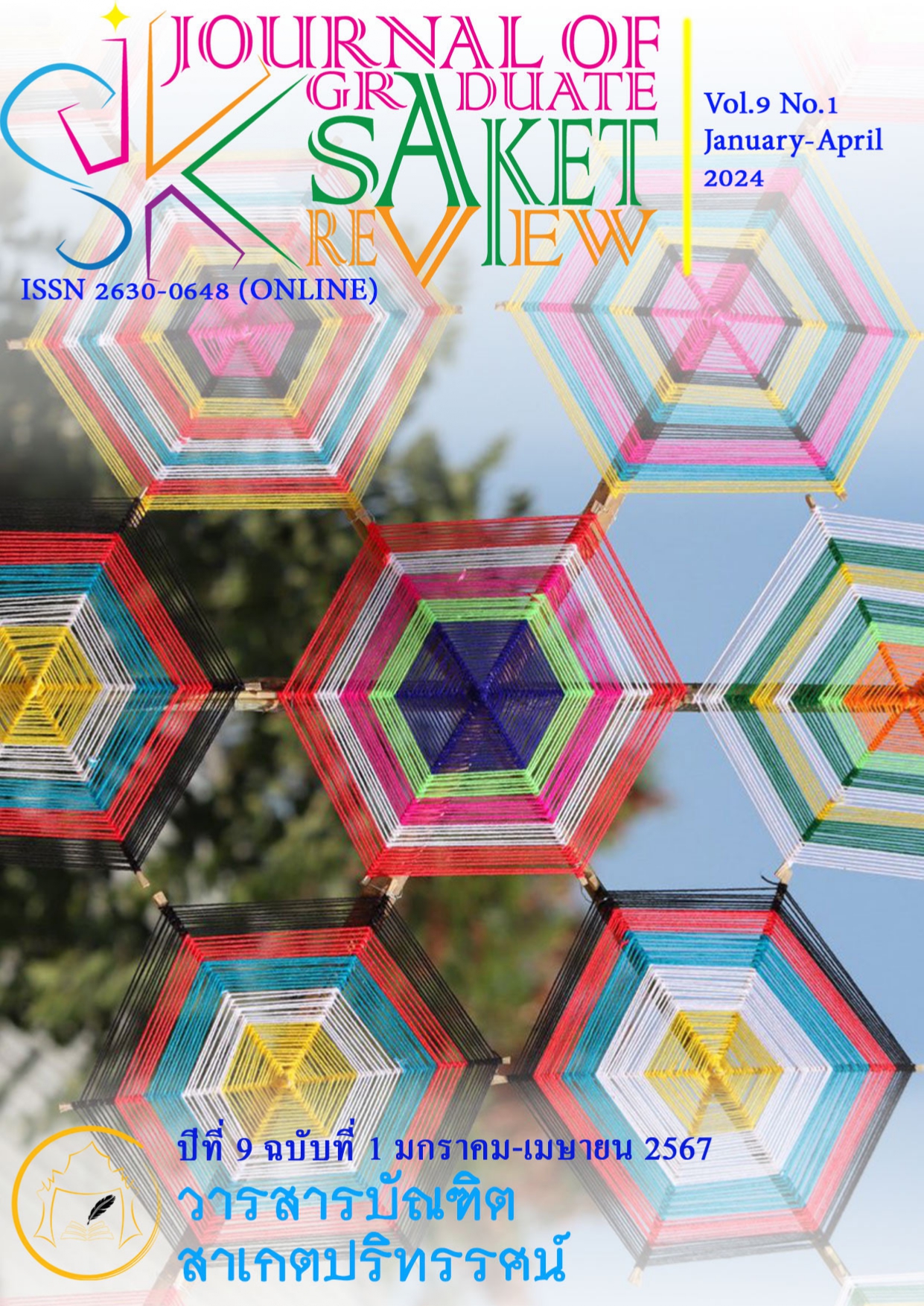ศึกษาคุณภาพชีวิตของผู้เข้าปฏิบัติธรรมวัดธัญญาวาส ตําบลหนองแก้ว อําเภอเมืองร้อยเอ็ด จังหวัดร้อยเอ็ด
Main Article Content
บทคัดย่อ
การศึกษาวิจัยเรื่อง “ศึกษาคุณภาพชีวิตของผู้เข้าปฏิบัติธรรมวัดธัญญาวาส ตําบลหนอง
แก้ว อําเภอเมืองร้อยเอ็ด จังหวัดร้อยเอ็ด” มีวัตถุประสงค์ ๑. เพื่อศึกษาหลักการพัฒนาคุณภาพชีวิต
ตามหลักพระพุทธศาสนา ๒. เพื่อศึกษาสภาพปัจจุบันของผู้เข้าปฏิบัติธรรมวัดธัญญาวาส ตําบลหนอง
แก้ว อําเภอเมืองร้อยเอ็ด จังหวัดร้อยเอ็ด ๓. เพื่อเสนอแนวทางการพัฒนาคุณภาพชีวิตของผู้เข้า
ปฏิบัติธรรมวัดธัญญาวาส ตําบลหนองแก้ว อําเภอเมืองร้อยเอ็ด จังหวัดร้อยเอ็ด การวิจัยนี้เป็น
งานวิจัยเชิงคุณภาพ (Qualitative Research) โดยวิธีการศึกษารวบรวมข้อมูลเอกสาร
(Documentary) และการศึกษาขอมูลภาคสนาม (Field Work study) โดยผู้วิจัยได้เลือกผู้ให้ข้อมูล
สําคัญโดยใช้วิธีการเลือกแบบเจาะจง จํานวน ๒๐ รูป/คน จึงสามารถสรุปผลการวิจัยดังนี้
ผลการวิจัยพบว่า
๑. หลักการพัฒนาคุณภาพชีวิตตามหลักพระพุทธศาสนา มีการพัฒนาทั้ง ๔ ด้าน ได้แก่ ๑)
การเจริญกาย พัฒนากาย การฝกอบรมกาย ๒) พัฒนาความประพฤติทางกาย วาจา และใจ ให้ตั้งอยู่
ในระเบียบวินัย ๓) การฝึกอบรมจิต ให้เข้มแข็งมั่นคง เจริญงอกงาม ด้วยคุณธรรมทั้งหลาย และ ๔)
ฝึกอบรมปัญญา ให้รู้ เข้าใจสิ่งทั้งหลายตามเป็นจริง รู้เท่าทันเห็นโลก
๒. วิเคราะห์สภาพปัจจุบันคุณภาพชีวิตของผู้เข้าปฏิบัติธรรมวัดธัญญาวาส ตําบลหนอง
แก้ว อําเภอเมืองร้อยเอ็ด จังหวัดร้อยเอ็ด พบว่า (๑) สภาพปัจจุบันคุณภาพชีวิตก่อนการปฏิบัติ
ธรรมของผู้เข้าปฏิบัติธรรม คือ ผู้เข้าปฏิบัติธรรม ส่วนใหญ่อายุมากไม่อยากเข้าร่วมกับหมู่คณะสงฆ์
มีภาวะร่างกายและจิตใจที่ย่ําแย่ เห็นวัตถุนิยมมีความสําคัญมากกว่าจิตใจ มีวิถีชีวิตที่ขาดศีลธรรม
และขาดความเมตตากรุณา อาศัยเครื่องอบายมุขแก้ไขปัญหาตนเอง ขาดสิ่งยึดเหนี่ยวจิตใจ (๒)
สภาพปัจจุบันคุณภาพชีวิตหลังการปฏิบัติธรรมของผู้เข้าปฏิบัติธรรม คือ เข้าร่วมกับหมู่คณะสงฆ์
ในการทํากิจกรรมที่เกี่ยวกับการปฏิบัติได้ดีขึ้น มีศีลธรรมเห็นโทษเห็นประโยชน์ของบาปบุญคุณโทษ
มีความสุขเพิ่มความเมตตากรุณา มีระดับจิตใจในทุกด้านดีขึ้น (๓) การพัฒนาคุณภาพชีวิตของผู้เข้า
ปฏิบัติธรรม คือ มีการพัฒนาด้วยการกําหนดกายพัฒนาที่มุ่งให้ร่างกายมีสุขภาพดี ความประพฤติ
ระเบียบวินัย ฝึกฝนอบรมกาย วาจา พัฒนามุ่งมั่นในการปฏิบัติตนอย่างสม่ําเสมอ แก้ไขให้ตรงจุด
และรอดพ้นจากความทุกข์
๓. แนวทางการพัฒนาคุณภาพชีวิตของผู้เข้าปฏิบัติธรรม คือ ด้านกาย จัดกิจกรรมหรือเพิ่ม
การปฏิบัติธรรมของผู้เข้าปฏิบัติธรรมอย่างต่อเนื่อง และต้องมีความเพียรในการปฏิบัติตนอยู่เสมอ
ด้านศีล ฝึกฝนให้จิตใจปราศจากกิเลส จนมีพลังอํานาจจากศีล ดําเนินงานการปฏิบัติตามหลัก
วิปัสสนากรรมฐาน ตั้งอยู่ในระเบียบวินัยอย่างมั่นคง ด้านจิต พัฒนาให้ผู้เข้าปฏิบัติธรรม มีปัญญารู้
เท่าทัน อดทน ตั้งมั่นอยู่ในความถูกต้อง ด้านปัญญา การพัฒนาและการปฏิบัติธรรม ผู้เข้าปฏิบัติ
ธรรม สามารถแก้ไขปัญหาที่เกิดขึ้นด้วยปัญญา เข้าใจถึงสภาพแห่งความเป็นจริงของสรรพสิ่งให้ถึง
เป้าหมายอันแท้จริง
Article Details

อนุญาตภายใต้เงื่อนไข Creative Commons Attribution-NonCommercial-NoDerivatives 4.0 International License.
เนื้อหาและข้อมูลในบทความที่ลงตีพิมพ์ในวารสารบัณฑิตสาเกตปริทรรศน์ ถือเป็นข้อคิดเห็นและความรับผิดชอบของผู้เขียนบทความโดยตรงซึ่งกองบรรณาธิการวารสาร ไม่จำเป็นต้องเห็นด้วย หรือร่วมรับผิดชอบใด ๆบทความ ข้อมูล เนื้อหา รูปภาพ ฯลฯ ที่ได้รับการตีพิมพ์ในวารสารบัณฑิตสาเกตปริทรรศน์ ถือเป็นลิขสิทธิ์ของวารสารบัณฑิตสาเกตปริทรรศน์ หากบุคคลหรือหน่วยงานใดต้องการนำทั้งหมดหรือส่วนหนึ่งส่วนใดไปเผยแพร่ต่อหรือเพื่อกระทำการใด ๆ จะต้องได้รับอนุญาตเป็นลายลักอักษรจากวารสารบัณฑิตสาเกตปริทรรศน์ ก่อนเท่านั้น
เอกสารอ้างอิง
มาลีวัล เลิศสาครศิริ. “ประสิทธิผลของโปรแกรมการฝึกสมาธิ ต่อพหุปัญญาของนักศึกษาชั้นปีที่ ๑วิทยาลัยเซนต์หลุยส์”. วารสารพยาบาลทหารบก. Journal of
The Royal Thai Army Nurses. ปีที่ ๑๗ ฉบับที่ ๑๓ (กันยายน-ธันวาคม ๒๐๐๖) : ๔.
เสถียรพงษ์ วรรณปก. สูตรสําเร็จแห่งชีวิต. กรุงเทพมหานคร: อมรินทร์พริ้นติ้งกรุ๊ฟ, ๒๕๓๓.
กนิษฐรัตน์ แสงจันทร์. “ความรู้ทัศนคติและการใช้ประโยชน์จากธรรมะของผู้ปฏิบัติกรรมฐานที่วัด อัมพวัน จังหวัดสิงห์บุรี”. วิทยานิพนธ์นิเทศศาสตรมหาบัณฑิต.
บัณฑิตวิทยาลัย: จุฬาลงกรณ์มหาวิทยาลัย, ๒๕๔๓.
พระครูวิมลธรรมรังษี(สุภาพ เขมรํสี). พุทธวิปัสสนา. พิมพครั้งที่ ๓. กรุงเทพมหานคร: สหธรรมิกการพิมพ์, ๒๕๔๐.
ศรีสด แสงสว่าง. “ศึกษาโพชฌงค์ในการปฏิบัติวิปัสสนาภาวนาตามหลักสติปัฏฐาน ๔ : เฉพาะกรณีการปฏิบัติวิปัสสนาภาวนา ๗ เดือน”. วิทยานิพนธ์พุทธศาสตรมหา
บัณฑิต. บัณฑิตวิทยาลัย : มหาวิทยาลัยมหาจุฬาลงกรณราชวิทยาลัย, ๒๕๕๒.
พระมหารุ่งเรือง รกฺขิตธมฺโม (ปะมะขะ). “ศึกษากรณีเยาวชนผู้ปฏิบัติวิปัสสนากรรมฐานณศูนยปฏิบัติธรรมสวนเวฬุวันอําเภอเมืองจังหวัดขอนแก่น”. วิทยานิพนธ์พุทธ
ศาสตรมหาบัณฑิต. บัณฑิตวิทยาลัย: มหาวิทยาลัยมหาจุฬาลงกรณราชวิทยาลัย, ๒๕๕๐


